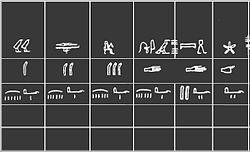- Digit (unit)
-
For other uses, see digit.
 Detail of the Ancient Egyptian cubit rod in the Museo Egizio of Turin, showing digit, palm, hand and fist lengths
Detail of the Ancient Egyptian cubit rod in the Museo Egizio of Turin, showing digit, palm, hand and fist lengths
The digit or finger is an ancient and obsolete non-SI unit of measurement of length. It was originally based on the breadth of a human finger.[1] It was a fundamental unit of length in the Ancient Egyptian, Mesopotamian, Hebrew, Ancient Greek and Roman systems of measurement.
In astronomy a digit is one twelfth of the diameter of the sun or the moon.[2]
Contents
History
Ancient Egypt
Main article: Ancient Egyptian units of measurementThe digit, also called a finger or fingerbreadth, is a unit of measurement originally based on the breadth of a human finger. In Ancient Egypt it was the basic unit of subdivision of the cubit.[1]
On surviving Ancient Egyptian cubit-rods, the royal cubit is divided into seven palms of four digits or fingers each.[3] The royal cubit measured approximately 525 mm,[4] so the length of the ancient Egyptian digit was about 19 mm.
Ancient Egyptian units of length[5] Name Egyptian name Equivalent Egyptian values Metric equivalent Royal cubit
meh niswt
![X1 [t] t](/w/extensions/wikihiero/img/hiero_X1.png)
![N35 [n] n](/w/extensions/wikihiero/img/hiero_N35.png)

7 palms or 28 digits 525 mm Fist 6 digits 108 mm Hand 5 digits 94 mm Palm
shesep
4 digits 75 mm Digit
djeba
1/4 palm 19 mm Mesopotamia
Main article: Ancient Mesopotamian units of measurementIn the classical Akkadian Empire system instituted in about 2150 BC during the reign of Naram-Sin, the finger was one-thirtieth of a cubit length. The cubit was equivalent to approximately 497 mm, so the finger was equal to about 17 mm. Basic length was used in architecture and field division.
Mesopotamian units of length Unit Ratio Metric
equivalentSumerian Akkadian Cuneiform grain 1/180 2.8 mm še uţţatu
Wikimedia Foundation. 2010.
Look at other dictionaries:
Digit — may refer to: Digit (anatomy), one of several most distal parts of a limb fingers, thumbs, and toes on hands and feet Numerical digit, as used in mathematics or computer science Hexadecimal, representing a four bit number Dit or digit, synonym of … Wikipedia
Unit. — Unitarian. * * * abbrev Unitarian * * * u|nit «YOO niht», noun, adjective. –n. 1. a single thing or person; individual member or part (of a group or number of things or individuals): »to regard husband and wife as the primary units of the family … Useful english dictionary
unit — ► NOUN 1) an individual thing or person regarded as single and complete; each of the individual components making up a larger whole. 2) a device, part, or item of furniture with a specified function: a sink unit. 3) a self contained or distinct… … English terms dictionary
unit — 1560s, single number regarded as an undivided whole, alteration of UNITY (Cf. unity) on the basis of DIGIT (Cf. digit). Popularized in John Dee s English translation of Euclid, to express Gk. monas (Dee says unity formerly was used in this sense) … Etymology dictionary
unit — [yo͞o′nit] n. [back form. (prob. modeled on DIGIT) < UNITY] 1. a) the smallest whole number; one b) a magnitude or number regarded as an undivided whole c) the number in the position just to the left of the decimal point 2 … English World dictionary
unit — [n1] whole assemblage, assembly, bunch, complement, crew, crowd, detachment, entirety, entity, gang, group, mob, one, outfit, ring, section, system, total, totality; concepts 432,837 Ant. part, piece unit [n2] part arm, block, component,… … New thesaurus
digit — [dij′it] n. [ME < L digitus, a finger, toe, inch < IE base * deik , to show, point > L dicere, to say: see DICTION] 1. a finger or toe 2. a unit of linear measure equal to 3/ 4 inch, based on the breadth of a finger 3. any numeral from 0 … English World dictionary
digit — unit of length equal to 3/4 of an inch Units of Measurement … Phrontistery dictionary
unit — /yooh nit/, n. 1. a single thing or person. 2. any group of things or persons regarded as an entity: They formed a cohesive unit. 3. one of the individuals or groups that together constitute a whole; one of the parts or elements into which a… … Universalium
Digit (length) — A digit (lat. finger ), when used as a unit of length, is usually a sixteenth of a foot, i.e. 3/4 Prime; or 1.905 cm (for the international inch). The width of an adult human male finger tip is indeed about 2 centimetres. In English this unit has … Wikipedia
